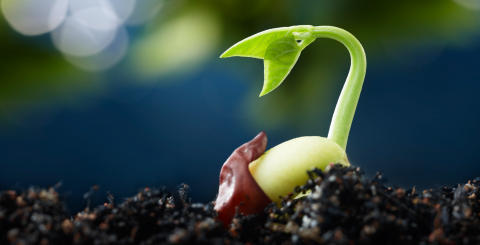Ordinary #11B (Mark 4:26-34)
I have come to realize how mysterious a thing a seed is.

I have found this chapter of the Gospel of Mark particularly interesting ever since my childhood, because much of it speaks of planting and growing and harvesting. I grew up in the city, where a few flowers and a blade of grass were about all the flora we ever saw. Buildings were gray, streets were gray, sidewalks were gray. But on weekends, and particularly on Christmas vacation, we would go to the farm where my father grew up. There the sky was blue, the soil was reddish brown, and everything in between was green. To see things grow, to go out early in the morning and help hoe the bean fields—this was fun! For years my dream was to study agronomy. Mark 4 intrigued me then, and in many ways it still does.
Earlier in the chapter there is the story of a sower who seems to scatter seed ruthlessly, with little care for where it falls. At our farm, when it was time to plant corn or beans, we would walk along the furrows with a stick, poking holes into the soil and carefully placing one or at most two seeds in each hole. In the parable a yield of a hundredfold seems extraordinary. If we only got 100 kernels or beans for each one we planted, we would be very disappointed. Eventually I learned that in earlier times a quarter of the crop had to be saved as seed for the next year and that it was only with the introduction into Europe of native American crops—beans, potatoes, maize—that yields of 100 to one were considered feasible.
Read our latest issue or browse back issues.
After the story of this strange sower there are words about lighting a lamp and putting it up high, on a lamp stand. This made little sense in my childhood home, where you hit a switch and the light came on. But at the farm it did make sense, because we had to light a kerosene lamp and hang it high.
Then comes this week’s text, the parable of the growing seed. This too was strange to me. Apparently this farmer would just sow the seed and then let it grow. He would “sleep and rise night and day” while the seed sprouted and grew. No weeding, no hoeing—just waiting and then harvesting. If we did that at our farm, we would harvest little but weeds.
Time has gone by, and I have come to realize how mysterious a thing a seed is. Today I can well imagine even the simplest farmer among Jesus’ hearers being awed by the mystery of a seed. Within that little kernel of corn—or that even smaller grain of wheat, or that mustard seed to which the next parable refers—there is the memory of centuries of death and rebirth, the legacy of millennia through which the plant has come to be what it is. And, even more surprisingly, there are all the instructions necessary to produce another plant just like the one from which the seed itself came.
Today we know about DNA and other such things, and therefore we have a better understanding of how a seed works. But this does not undo the mystery. At best it pushes it back to another level. The seed I hold in my hands today—just like each of those grains that the farmer in the parable scatters and lets grow—summarizes millennia upon millennia of evolution. It contains a promise of future plants for as long as the earth will last.
The farmer in the parable can trust the seed to grow according to the promise sealed in it. He must trust the seed to grow, for there is little he can do to make it grow, and nothing he can do to turn it into any future other than what is already promised in it. In due time, the seed will grow. Because the future is in the seed and not in the farmer’s doings, he can “sleep and rise day and night,” trusting in the promise of the seed. Were he responsible for the seed’s growth, he would lose sleep over it, constantly wondering what more he could do to make sure that the seed becomes what it is supposed to be.
Unlike the sower in the parable, I have difficulty trusting the seed to grow. This makes me a poor gardener, for I am constantly going out to the garden to see what has sprouted, and I grow impatient with the seeds’ slow development. If I trusted the seeds a bit more, I would simply weed and water and then let them do their thing.
This is what makes this parable both difficult and necessary for me. I know, at least in theory, that the past, the present, and the future are in the hands of the God who has packed past, present, and future into a tiny grain of wheat. But I just can’t wait for God to make the seed grow in God’s own time. I want to resolve matters now! I want to change the church. I want to change the world. I even want to change myself.
All of this is good—but only if it comes within the context of trusting the seed and the God of the seed, and thus being able to “sleep and rise night and day” even while the seed grows. When the seed is ripe, no matter what I have done or how much sleep I have or have not lost over it, the harvest will come.





